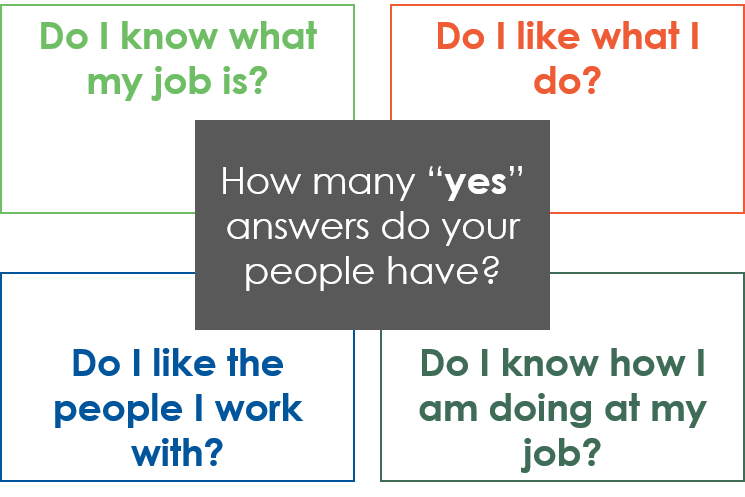Engaging Your People: The Four Question Matrix
Never miss a thing.
Sign up to receive our insights newsletter.

Over the next year, organizations need to increase their efforts to improve mental and emotional well-being in the workplace. People are out-of-synch, stressed, and introspective. Your human resource professionals will face increasingly thorny issues related to job performance, fit, motivation, supervision, and more serious issues of depression and substance abuse.
Leaders can’t solve every personal problem the people under their care face. But they can engage in highly effective and proven strategies: talk, ask, listen. Decades of scholarship and research does its best to complicate the practice of management. But most of the time, it’s not rocket science, either in relatively normal or extraordinary times. In my experience, a simple four-question matrix often wins the day.

Take a mental snapshot of the people on your team. For each person, how many “yes” answers do you think they have? How many “no” answers? When was the last time you asked? Because the world of work constantly evolves.
Do I know what my job is?
This question speaks not only to having an accurate job description, but also to expectations. People like to know what the organization needs from them. The specific tasks, availability and deadlines associated with a job can be quantified. But how does a person’s job fit into the larger goals and objectives of the organization? That connection can be lost over time. Leaders help their people feel connected and underscore their importance to the team.
Do I know how I am doing at my job?
There is a place for annual performance evaluation. When combined with interval assessment and peer reviews or a 360 component, you gain a clear understanding of how you measure up to expectations. Of course, depending on formal feedback to know your standing in an organization has its downsides, especially in the absence of daily contact. For some – even high performers – evaluation can be stressful and cold. Leaders relieve stress by providing constant feedback. This is one question your people should never have to ask.
The first two questions are professional, moving to the right side of the matrix leads you down a path pf personal engagement. You probably will not retain employees who do not like their jobs or the people with whom they work. Here are some ideas to mitigate that risk.
Do I like what I do?
There was a time in American life where job enjoyment was not an employer’s responsibility. You work. You get paid. You go home. There are still pockets of government and industry where that dynamic may exist but ignoring job satisfaction impedes your success. This is not a “kind and gentle” management style; it has direct impacts on productivity. Don’t assume someone who liked their job in the first two years still does. People desire change, new challenges, different scenery, opportunities to pursue and problems to solve. That could be within someone’s current assignment, somewhere else in the organization, or someplace new (including retirement). Sometimes people simply want to express their opinions. Make sure you give them the space to do so.
Do I like the people I work with?
Dangerous territory. You can get a feel for the morale of an office just by walking around and observing the energy, interactions, and how people treat each other. Unless, of course, everyone has been sent home and been working remotely for the last year. As the work environment changes in the coming year, the personal dynamics in your space will change along with it. A leader does not have to solve every inter-personal conflict on a team but does need to ensure a respectful and productive environment. Observe, listen, and tactfully ask when you sense conflict. Chemistry matters.
If the past year has taught us anything it is that there are no certainties in life, or in work. The next few years will see a far more diverse array of work modes, environments, and evolving co-worker relationships. How to adapt to a brave new world? Step one: listen to your people. Listening provides the foundation for improving the emotional intelligence of your workplace. That intelligence can unlock a brighter future for your organization.
For more information, contact us. We are here to help.
Adam Jones is a writer, management consultant and the organizational assessment practice leader for Weaver.
© 2021